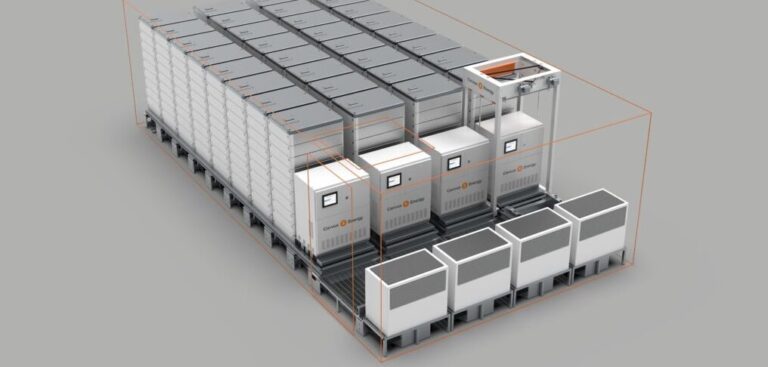Corvus Energy says it has reached an agreement with Seaspan Ferries, of Delta, British Columbia, Canada, for the first delivery of Corvus’s Blue Whale energy storage system (ESS), to be installed on board one of its cargo ferries.
Blue Whale is a new large-scale ESS – a battery system designed for large ships with high zero-emission energy demand, such as cruise ships, large ro-pax and ro-ro ferries, and cargo ships. According to Corvus, its rack-free design of stacking modular blocks provides the industry’s highest volumetric battery room energy density and, consequently, maximizes passenger and payload opportunities.
For its inaugural field trial, the battery system will be installed on board Seaspan Reliant, a roll-on/roll-off drop-trailer cargo ferry built in 2016 that sails the Salish Sea, with service between British Columbia’s Lower Mainland and Vancouver Island.
“Seaspan has been an important partner for Corvus Energy. They were among the first to install our batteries in North America. Their extensive experience on our battery systems and knowledgeable team make them the ideal field trial partner,” said Sean Puchalski, EVP strategy and business planning at Corvus Energy. “Corvus Energy is grateful for the generous funding provided to both Corvus and Seaspan by Canada’s Ocean Supercluster, an initiative of Innovation, Science and Economic Development Canada.”
“The field trial is an important pre-commercial activity that enables the development team to validate requirements for a high-volume robotic production line and a range of complex post-production processes. During this time of restricted travel due to Covid-19, being able to conduct the field trial in the same location as our Canadian development and manufacturing facilities is a huge benefit and allows us to stay on schedule for commercial product release,” added Richard Wing, chief research and development officer at Corvus Energy.
The ESS will replace an in-service first-generation Corvus AT6500 ESS in the existing battery room, increasing the vessel’s energy storage capacity from 545kWh to 1,892kWh.
“Although Seaspan Reliant is a relatively small vessel for a Blue Whale system and the retrofit will be done on a very tight schedule, the challenging conditions make it ideal for a trial site,” Corvus’s Wing continued. “Moving and situating the Blue Whale modules and pack controllers into the existing battery room will also test and validate the materials handling equipment and service tools we have developed.”
Installation of the system is scheduled for summer 2021, at which time Seaspan also plans to relocate the AT6500 system onto sister vessel, Seaspan Swift. Commissioning and trials will be carried out while the vessel is in full-service operation during the remaining months of 2021. With three-and-a-half times the previous energy capacity, Seaspan hopes it will be able to expand the use of battery power beyond spinning reserve to also provide fuel-efficient peak shaving, load balancing, and even zero-emission operation on battery power only.
Once installed, performance data from the ESS will be collected automatically, analyzed and monitored remotely through Corvus’s cloud-based monitoring and optimization system, providing feedback to the R&D team. The field trial and all key maritime authority certifications are expected to be completed by spring 2022, at which time commercial deliveries will commence.



